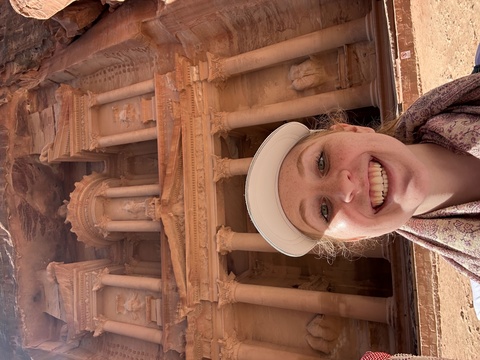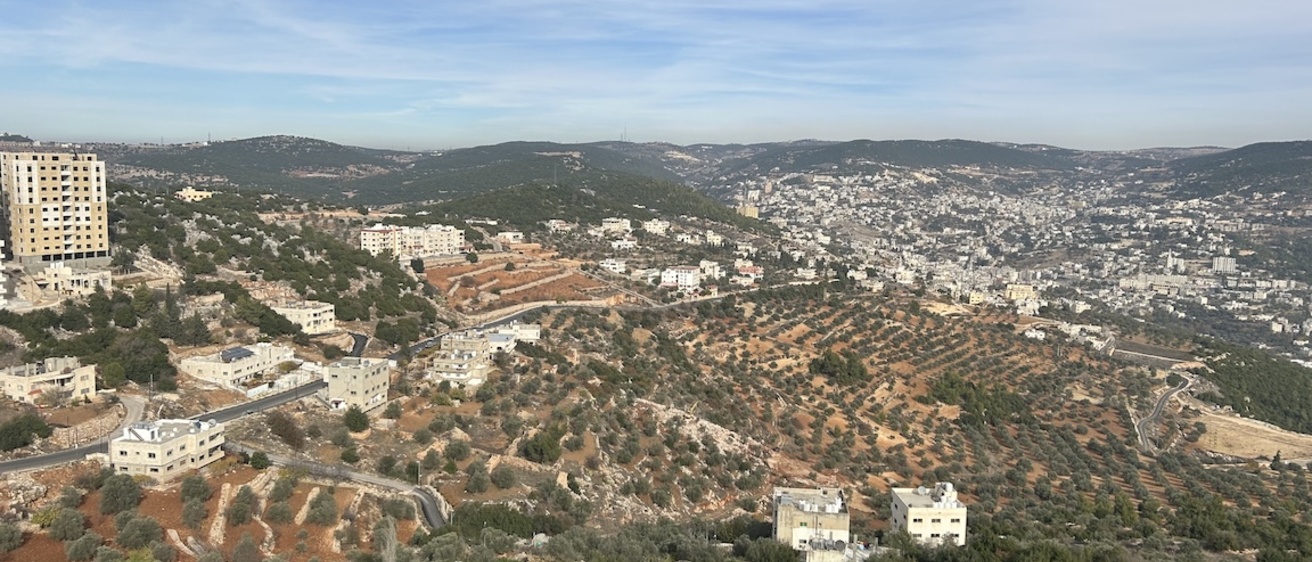Living with a homestay family was the most formative experience of my study abroad. I was paired with an all-female homestay, which really contributed to my understanding of Jordanian culture and my ability to feel at home in Jordan. My homestay family's boisterous and exciting personalities were like mine, making it feel like my home life was transported into the Middle East. I can't imagine my experience without loud nights in the kitchen watching “The Lincoln Lawyer” (lovingly pronounced Lin-ko-lyn by my homestay family) or eating together after work. Even though I didn't know enough Arabic to have longer conversations with any neighbors or aunties who came over, they always left a spot for me in the living room so I could feel included. They really made me feel like I had a home in Jordan where I belonged.
Going to Jordan this semester was my first time traveling in the Middle East, and its similarities to the U.S. surprised me a lot. For example, mall culture is very big in Jordan.

"I don’t know if I didn’t expect many Western companies to be in the Middle East, or if it was just the sheer number of malls that surprised me, but I didn’t realize how similar Jordan was to the U.S. in its love for shopping."
Seeing Jordanian companies alongside global brands like Popeyes, Baskin-Robbins, and American Eagle took some adjusting to. Despite this, these similarities were somewhat comforting when I missed America, and they reminded me how much globalization has affected the world. I also learned quickly that going to cafes and malls at night made up a significant portion of social life in Amman, with many stores often closing at midnight or 2 a.m. to accommodate the crowds. I wasn’t used to this, having gone to school in Iowa, where everything closes around 8 p.m. But I found that going out to cafes and seeing the nightlife of Amman with my homestay family and Jordanian friends became a highlight during my study abroad experience.
My SIT program was all about refugees, health, and humanitarian action. As such, I learned a lot about global protections for refugees and how international organizations like the U.N. interact with nonprofits in Jordan to protect vulnerable populations. After going on our country excursion to the U.N. and the WHO in Geneva, Switzerland, I was inspired to find a career that would allow me to interact further with people in these global organizations. This has led me to pursue a job in the U.S. State Department with the Bureau of Populations, Refugees, and Migrants. I was first exposed to this agency when I planned a project for them during my internship at the Jordanian Institute for Family Health (IFH). I collaborated on a proposal that would satisfy U.S. humanitarian goals, U.N. protection rights under the Convention on the Rights for Persons with Disabilities, and IFH’s goals to deliver affordable disability and rehabilitation services to refugees by making a capacity-building project for IFH’s existing hearing and vision screenings. This project taught me how nonprofits cater to the goals of larger international organizations and exposed me to how I could have an impact through on-the-ground health services, helping refugees through a multilateral career with the U.S. government. Additionally, seeing how global protocols like the CRPD were implemented in my day-to-day work at IFH taught me how international protections were applied locally, which contributed greatly to my interest in human rights and international law in my international studies major.
One memory that will stick with me for the rest of my life is when I went to an Iraqi restaurant with a group of friends and their colleague from the nonprofit Princess Taghrid Institute. Their colleague was an Iraqi herself who had been living in a Bedouin village in Jordan. I enjoyed hearing her share her life and the food we ate at the restaurant. Particularly, she was close with the restaurant owner, who was Syrian. We went to the restaurant a couple of days after the fall of Bashar al-Assad, the former dictator of Syria, and most Syrians I had met seemed happy with current events. This led my friend's colleague to start a conversation with the owner about when he came to Jordan and if he would go back to Syria now that the regime was toppled. He told us about his life in Syria before the conflict and the challenges that led him to seek refuge in Jordan, including the tragic death of several of his family members in the war. Hearing what his life could be like if he went back to Syria now that al-Assad was ousted was inspiring, but also a sobering reminder that his hardships might not yet be over. I still think about him a lot, and the rest of the refugees I met in Jordan, and how their futures are impacted by many things we are fortunate enough not to deal with in the U.S.
Studying abroad has broadened my perspectives on the world and focused my international studies major on human rights and humanitarian work. For example, my internship at the Institute for Family Health and visit to the U.N. in Geneva allowed me to witness first-hand the application of global human rights policies, which enhanced my understanding of how international protection measures are applied at the country level. Studying abroad has also given me a vital chance to improve my Arabic language and cross-cultural communication skills, as everyday life was an opportunity to navigate a foreign environment. I hope that these skills will guide me in my future career choice, and my plans to go to Jordan again in the future to improve my Arabic.
If I hadn't gone abroad, I would never have dispelled my misconceptions about life in Jordan and the Middle East. Living with a homestay family, and having my coursework integrated with organizations that serve refugees and vulnerable Jordanians, showed me all sides of Jordan and helped me meet people from across the Levant region. Learning about these populations helped me dispel many of my biases about the region, which I had contracted from years of watching Western media outlets cover conflicts there. The Middle East has many ongoing conflicts, but these fortunately do not define the day-to-day life of most people in Jordan. Alongside this, I think Jordan gets a reputation as more conservative than it is due to following religious laws, like Sharia law.
"If I hadn't gone abroad, I would never have dispelled my misconceptions about life in Jordan and the Middle East."
Seeing how similar Amman was to major cities in the U.S., in both people's open attitudes and in paving the way for Jordan’s modernizing infrastructure, helped me realize this.
Receiving the Global Access Ambassador Scholarship not only helped make my study abroad financially possible but also allowed me to share my time in Jordan with other students at Iowa. I hope to inspire students through my experiences and motivate them to study abroad in non-Western countries through programs that will challenge their beliefs and excite them to learn. Having the support of the Global Access Ambassador Scholarship on my journey in Jordan has made it possible for me to continue exploring diverse global cultures and build vital Arabic language skills that will benefit my future career goals in the U.S. government. I am so grateful to Iowa who made this trip possible, and I look forward to future opportunities to learn about the Middle East in my international studies major and abroad.
The Global Access Ambassador Scholarship program provides awards to study abroad for a summer, semester, or academic year. The scholarships are intended to support students who study abroad with the intent to serve as Global Access Ambassadors upon return to the UI campus. Upon completion of the study abroad program and return to UI, award recipients are asked to submit a photo and an open letter to prospective students or suggest an alternate means of sharing with prospective students.
Please note that the opinions and views expressed by ambassadors are solely those of the students and do not reflect or represent the views of International Programs or the University of Iowa.
International Programs (IP) at the University of Iowa (UI) is committed to enriching the global experience of UI students, faculty, staff, and the general public by leading efforts to promote internationally oriented teaching, research, creative work, and community engagement. IP provides support for international students and scholars, administers scholarships and assistance for students who study, intern, or do research abroad, and provides funding opportunities and grant-writing assistance for faculty engaged in international research. IP shares their stories through various media, and by hosting multiple public engagement activities each year.
